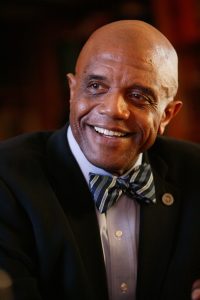The University of Richmond has found its new leader.
The school on Monday announced the selection of Ronald Andrew Crutcher, a classical musician and most recently the president of Wheaton College in Massachusetts, as its next president.
Crutcher will take the helm July 1 as UR’s 10th president. He’ll replace Edward Ayers, who last March announced his plan to step down after eight years as president. Crutcher will be the university’s first black president.
A classically trained cellist, Crutcher served 10 years as president at Wheaton, a private liberal arts college between Boston and Providence, Rhode Island. He stepped down from that role last year.
Prior to Wheaton, Crutcher was a music professor and served five years as provost of his alma mater Miami University of Ohio. A performing musician to this day, Crutcher went on to become the first cellist to receive a doctorate of musical arts from Yale University, according to the school’s release.
In Monday’s announcement, UR emphasized Crutcher’s experience in fundraising and capital projects. He oversaw Wheaton’s $137.6 million fundraising campaign that the school said exceeded a goal of $120 million a year ahead of schedule. He also oversaw Wheaton’s largest capital project: a $46 million science and technology center.
Crutcher, 66, was selected following a months-long, national search conducted by a committee of students, alumni and faculty.
Crutcher was not available for comment Monday. In a release, he called his appointment “an exceptional honor.”
“This has long been a place of academic excellence,” Crutcher said of UR, “and it is also a place of substantive progress on issues that all of American higher education is seeking to address such as ensuring access to educational opportunity to the most promising students of all backgrounds.
“Much that animates Richmond has animated my own work over decades,” he said, “and I look forward to working with the University community to build on Richmond’s remarkable foundation.”
Ayers, who will remain at Richmond in a faculty role teaching history, oversaw a nearly 50 percent increase in undergraduate applications and progress on the first phase of the university’s 10-year master plan during his tenure.
That plan included the creation of the international center, an addition to the business school, renovations to the law school and the Robins Center and construction of residence halls and a student activity center.
Ayers’ departure was timed to coincide with the completion of UR’s strategic plan, called “The Richmond Promise.” The initiative was tied to a fundraising campaign that recently exceeded its goal of $150 million. The campaign, launched in 2013, raised $162 million from more than 25,000 donors.
The university also saw steady growth to its endowment, which last year had surpassed $2 billion. UR’s total enrollment is currently 4,140 – nearly three times that of Wheaton’s 1,600.
UR will hold a reception to welcome Crutcher this Friday at 2 p.m. in the Robins Center arena. A brief program will precede the reception, which is open to students, alumni, faculty and staff.
The University of Richmond has found its new leader.
The school on Monday announced the selection of Ronald Andrew Crutcher, a classical musician and most recently the president of Wheaton College in Massachusetts, as its next president.
Crutcher will take the helm July 1 as UR’s 10th president. He’ll replace Edward Ayers, who last March announced his plan to step down after eight years as president. Crutcher will be the university’s first black president.
A classically trained cellist, Crutcher served 10 years as president at Wheaton, a private liberal arts college between Boston and Providence, Rhode Island. He stepped down from that role last year.
Prior to Wheaton, Crutcher was a music professor and served five years as provost of his alma mater Miami University of Ohio. A performing musician to this day, Crutcher went on to become the first cellist to receive a doctorate of musical arts from Yale University, according to the school’s release.
In Monday’s announcement, UR emphasized Crutcher’s experience in fundraising and capital projects. He oversaw Wheaton’s $137.6 million fundraising campaign that the school said exceeded a goal of $120 million a year ahead of schedule. He also oversaw Wheaton’s largest capital project: a $46 million science and technology center.
Crutcher, 66, was selected following a months-long, national search conducted by a committee of students, alumni and faculty.
Crutcher was not available for comment Monday. In a release, he called his appointment “an exceptional honor.”
“This has long been a place of academic excellence,” Crutcher said of UR, “and it is also a place of substantive progress on issues that all of American higher education is seeking to address such as ensuring access to educational opportunity to the most promising students of all backgrounds.
“Much that animates Richmond has animated my own work over decades,” he said, “and I look forward to working with the University community to build on Richmond’s remarkable foundation.”
Ayers, who will remain at Richmond in a faculty role teaching history, oversaw a nearly 50 percent increase in undergraduate applications and progress on the first phase of the university’s 10-year master plan during his tenure.
That plan included the creation of the international center, an addition to the business school, renovations to the law school and the Robins Center and construction of residence halls and a student activity center.
Ayers’ departure was timed to coincide with the completion of UR’s strategic plan, called “The Richmond Promise.” The initiative was tied to a fundraising campaign that recently exceeded its goal of $150 million. The campaign, launched in 2013, raised $162 million from more than 25,000 donors.
The university also saw steady growth to its endowment, which last year had surpassed $2 billion. UR’s total enrollment is currently 4,140 – nearly three times that of Wheaton’s 1,600.
UR will hold a reception to welcome Crutcher this Friday at 2 p.m. in the Robins Center arena. A brief program will precede the reception, which is open to students, alumni, faculty and staff.




